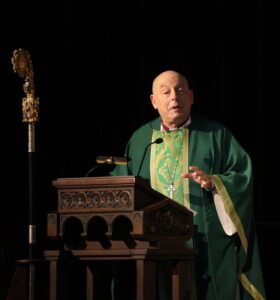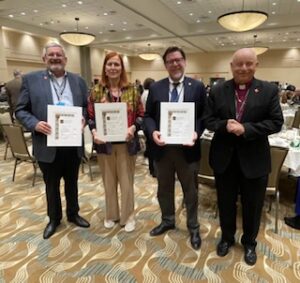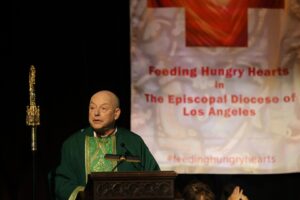 [The Episcopal News] The Rt. Rev. John Harvey Taylor delivered a fiery final address Nov. 7 to the 130th annual meeting of the Diocese of Los Angeles, frequently interrupted by applause and cheers, hailing egalitarian “Christian originalism,” and continued commitment to Sacred Resistance while focusing on “4 Rs” marking his nine-year tenure as bishop: reconciliation, reform, real estate and relationship.
[The Episcopal News] The Rt. Rev. John Harvey Taylor delivered a fiery final address Nov. 7 to the 130th annual meeting of the Diocese of Los Angeles, frequently interrupted by applause and cheers, hailing egalitarian “Christian originalism,” and continued commitment to Sacred Resistance while focusing on “4 Rs” marking his nine-year tenure as bishop: reconciliation, reform, real estate and relationship.
“This isn’t the time to stop paying attention – or keep issues of public policy out of the pulpit or Bible study – or worry too much about offending someone who doesn’t agree, as long as we speak the truth in love,” Taylor told several hundred lay and clergy delegates gathered at the Riverside Convention Center to elect his successor.
“We can’t leave what power does to people out of church – we can’t leave out of church what people are entitled to receive from those in power.”
Taylor, who was elected the seventh bishop of Los Angeles in December 2016, will officially retire in October 2026, when he reaches the mandatory clergy retirement age of 72. After four ballots Nov. 7, however, no successor was chosen from a slate of three candidates – the Rev. Antonio Gallardo, rector of St. Luke’s Church in Long Beach, California; the Rev. Canon Melissa McCarthy, Los Angeles canon to the ordinary, and the Rev. Monica Burns Mainwaring, rector of St. Martin in the Fields, Atlanta.
Gallardo maintained a lead on the fourth ballot, garnering 124 votes in the lay order and 86 among clergy, with 170 lay votes and 131 clergy votes, or a two-thirds majority of those present, needed to elect. Mainwaring was second, with 91 lay votes and 82 clergy votes and McCarthy had 40 lay votes and 28 clergy votes. Voting will continue with a fifth ballot on Nov. 8.
Delegates also approved resolutions recommitting to the gospel work of sanctuary, and affirming support for Migration with Dignity, the immigrant justice policy adopted by the 81st General Convention of the Episcopal Church (Resolution C031). Among other actions, the resolution calls upon parishes and missions to observe a Migration with Dignity Sunday during the season of Epiphany.
Delegates also approved a $6.65 million Mission Share Fund budget for 2026, part of the overall $13 million diocesan budget, and saluted outgoing diocesan treasurer Andy Tomat. Outgoing chancellor Richard Zevnik was honored and Cathy Helm welcomed as interim chancellor.
 Taylor, who was celebrated at a Friday evening dinner, also named three honorary canons of the Diocese: Christine Budzowski, president of the diocesan Episcopal Church Women; Dan Valdez, financial professional and chair of the Episcopal Community Federal Credit Union; and vice chancellor Jeff Baker, who will deliver the Margaret Parker keynote lecture Nov. 8.
Taylor, who was celebrated at a Friday evening dinner, also named three honorary canons of the Diocese: Christine Budzowski, president of the diocesan Episcopal Church Women; Dan Valdez, financial professional and chair of the Episcopal Community Federal Credit Union; and vice chancellor Jeff Baker, who will deliver the Margaret Parker keynote lecture Nov. 8.
Christian ‘originalism’ and “4 R’s: reconciliation, reform, real estate and relationship”
Taylor hailed The Episcopal Church’s “unique breakthroughs on the ordination of women and then opening all orders to all people, notwithstanding race or nation, orientation or identification … these historic and holy moves strained to return us to the vicinity of Jesus’s egalitarianism. It’s not woke; with apologies to the Supreme Court, let’s call it Christian originalism.”
Ten months into Taylor’s tenure as bishop coadjutor, then-Presiding Bishop Michael Curry contacted him and asked him to attempt reconciliation measure in an attempt to reach a negotiated solution to conflict created when his predecessor, Bishop J. Jon Bruno, attempted to sell St. James Church in Newport Beach, he told delegates.
Ultimately, a church disciplinary panel recommended a three-year suspension for Bruno and that St. James be returned to the diocese and the control of its members.
 “What we put on paper in the fall of 2017 was a kind of ecclesiastical Shanghai Communique – that’s the document that theoretically still governs how the United States and China deal with Taiwan. Our agreement acknowledged both sides of what had been a rancorous issue. I pledged that the effort to sell the church had ended. St. James pledged to join us in reconciliation,” a two-year mediation process.
“What we put on paper in the fall of 2017 was a kind of ecclesiastical Shanghai Communique – that’s the document that theoretically still governs how the United States and China deal with Taiwan. Our agreement acknowledged both sides of what had been a rancorous issue. I pledged that the effort to sell the church had ended. St. James pledged to join us in reconciliation,” a two-year mediation process.
The root of the problem, Taylor said, was money. “In those days, the diocese was spending far more than it was taking in, relying on the sale of sacred property to pay the bills and also support a substantial, sometimes alarming, rate of discretionary spending. St. James was a valuable chunk of real estate, but it was also a successful church, and their people had the resources and the gumption to say no,” Taylor said.
Taylor promised not to sell any sacred properties, while also pledging to build affordable housing on 25% of diocesan properties. “It’s been over eight years, and we haven’t sold a square foot of sacred real estate.” Three projects have been completed and many more are on the drawing board, he said.
“Mission-appropriate development of our vast real estate holdings is one of many ways we can use our God-given resources to care for our neighbors while making it possible for our ministries to persist and thrive.”
Other highlights Taylor mentioned during his address (which may be viewed here) included:
- Nearly $1.1 million in One Body and One Spirit grants to support congregations;
- Nearly $900,000 a year in grants to mission congregations;
- Creation of a joint budget committee to balance diocesan budgets “while not selling churches or tapping recklessly into trust funds” such as Corp Sole, an “anachronistic institution called the Bishop as a Corporation Sole,” which owns scores of churches as well as other funds, and which was sometimes used to balance the diocesan budget with last minute six-figure grants;
- The transfer of about $8.7 million to the Corporation of the Diocese from Corp Sole, bringing the diocesan endowment fund to about $13.6 million, with only 4% available for spending;
- Moving to a mandatory 12% mission share fund assessment after organizational shifts enabled Corporation of the Diocese directors the opportunities to strategize solutions.
Taylor noted that in the 5-1/2 county diocese with 133 congregations, “every Sunday, as well as over a score of churches where English is not the principal language of worship, where people worship in Mandarin, Cantonese, Spanish and Korean, in every one of those congregations our precious siblings in Christ are afraid to go to church, work, the store, and birthday parties because of Trump’s cruel ICE roundups.”
He added: “the value of applying reconciliation does not require me to have a certain point of view on immigration reform. It does require me to weep because my sibling in Christ is afraid or at risk. The same is true today for our trans and non-binary siblings – they are experiencing existential fear because of the explicit policies of our cruel government.”
He added: “The Episcopal Church, according to the commission of our Lord and Savior Jesus Christ, does not have the option of giving up and going away. Our charism, for all intents and purposes, is absolutely unique in Christendom. We are a little miracle.
“Timeless, small c-catholic worship, rooted in study of the living Word. Sacramental faith that the saving power of the risen Christ drenches everything and at long last, the value that everyone belongs, across all barriers of race and nation, orientation and identification. We are a little miracle, and my friends, we are here to help save America.”
